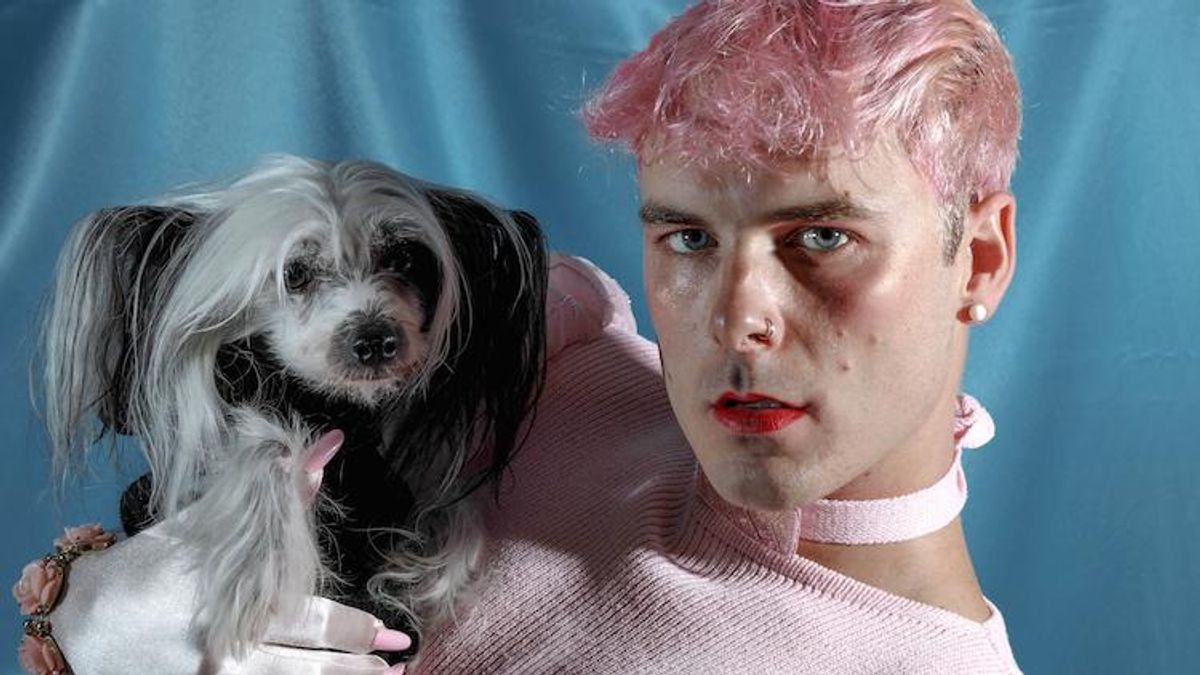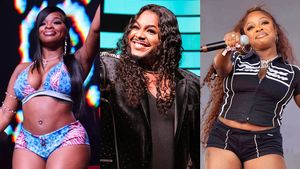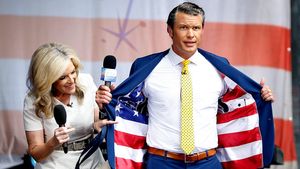Suno Deko's breakout moment might have come from his single "Swan Song," but the poet and experimental-pop musician is just getting started. With a debut EP, Suno Deko, under his belt, the artist, whose real name is David Courtright, has built an image around a pseudonym inspired by his work with a New Delhi painter--"suno" meaning to look and "deko" meaning to listen.
A month after releasing his self-titled album, he's channeled this curiosity and mindfulness while asking and answering large scale questions about the world through his music, but who is the man behind this cinematic and enigmatic alias? Hailing from Atlanta, Courtright is first and foremost a poet. While his current music deals with global ideas and concepts, Courtright is already working on his next and very personal project on life, love and loss.
His own story is slowly unfolding through his expanding catalogue of music, but as we sat down to talk to him last month, he began to fill in the gaps.
OUT: You identify as both a poet and musician. Which came first? Or do you find the two synonymous?
Suno Deko: In terms of putting things out into the world, I would say I was a poet first. I put out a small chapbook in 2013, around the same time I was starting this project. I was really involved in the Atlanta poetry world back then. Before this project, I was in a band and simultaneously doing a lot of poetry stuff, but then that band broke up, I started this project and stopped writing poetry as much. I do think they are very much intertwined. I definitely reference and think about lyrics as if they could stand alone as a poem... Or I would hope that I do.
How did you become a musician?
I started playing trumpet in fifth grade and then played saxophone all throughout middle school and high school. Music was always in my life and I always wanted it. I started playing guitar when I was 16, [but] I was just in it to learn all the Dave Matthew songs. Then I got more into Bob Dylan and started writing more poems.
I started really playing guitar when I lived in Thailand after college--I basically came out to my family and close friends and then moved to Thailand the next day. I was 21 and I did this thing called Artist Way, which is a spiritual and creativity workbook. Through that, I started challenging myself to play [live] shows. After living briefly in India, I moved back to Atlanta in 2010 and joined a band.
We were really dedicated, but it ended up not working out. But we made a record and played a bunch of shows and toured a bunch and that's what introduced me to that world. When I started this project, I just kept touring and started meeting all of these amazing people that have become my community, and that's my musical journey.

Photography: Brian Vu
How did you find your sound?
It came from being in that band. I knew that I wanted to make my own music, but everything I was making [in the band], I just didn't like. I was in the studio trying to make songs and felt like what was coming out was not anywhere near what I was feeling in my mind--it took me a long time to feel proud or okay about what I was doing. I found my sound through hours of making really bad stuff. I think, more and more for me, this project has been a way for me to excavate my own childhood self and identity. It's a way of using art as a vehicle to understand myself better and the parts of myself as a child that I suppressed or didn't feel like I had the courage or freedom to fully explore.
Did this oppression stem from your upbringing in the South?
I grew up in a pretty liberal place. I recorded all of the vocals for the record in a church I grew up going to. That was a really queer, inclusive space, which was really amazing and kind of peculiar. But you still go to school, and you still--I don't know. I found my sound trying to emulate some of the people whose music I really liked, but I also used music as a way to figure out things about myself or figure out puzzles that I set out for myself.
How did you get from Atlanta to New York?
I was living in Atlanta for a long time, and I had a partner. We lived in this beautiful house in Atlanta together, and I was making music and playing shows and touring a lot. Then, my partner and I were both ready to leave Atlanta because we felt pretty creatively held back there, so we moved [to New York] and then broke up--but I wanted to move here anyway. A lot of my community is here. My best friend, Julie, lives here. My publicist for this record is my roommate. It's just a really special community of people and I just don't think I could go back to Atlanta at this point.

Photography: Brian Vu
When exploring your discography, I noticed that you first started releasing music in 2014. Coincidentally, fan favorites' "Thrown Color" and "Swan Song" are representative of these two 'eras.' Why the brief hiatus from music? Has your sound evolved since then?
It was a longer gap than I was planning for, but I never really took a hiatus. It's interesting because half of the songs on my new record are from the "Thrown Color" era--"Wedding March," "Born Again" and "Falling In." There are a lot of songs that have been around for a while, but there are also newer ones like "Swan Song." On that previous EP, I was very focused on being able to play everything myself and recreate it live. With this record, I allowed myself to let that go.
On the EP, I played everything and thought that was really cool and a really intellectual puzzle to solve. Once I moved through that paradigm though, I was like, 'this is actually really restrictive.' I wanted to expand everything. I wanted to make a huge song like "Swan Song." I became more interested in pushing the performance, vulnerability and emotional resonance of the song rather than the technical, 'cool' stuff. It felt more important that the song was good and that the delivery was good than thinking, 'oh, it looked cool onstage when I did everything myself.'
What is "Swan Song" about? What does it mean to you?
It's about being in love with someone and very, very close to someone, but feeling like maybe you can never really get all the way in--feeling like maybe it's impossible to truly know someone else. The title felt like I was bidding farewell to what I thought love was in my head versus what I was experiencing. It's not so much a lament, but more an acknowledgment that it takes a very special person or connection to feel that. It may not even happen with someone you're with for a long time. Personally, that's what it's about. Universally, it's about letting go of how you think things are supposed to be or how you think people are supposed to be in relation to you. Setting that free and letting them be who they are.
What are central themes on this EP?
There are dramatic moments and emotional waves and that are planned out, [and] the track order was labored over. Thinking about the album as a piece of work--as a journey--has always figured heavily into my thought process. It's not just a bunch of songs and it's not a concept album, but there is an intention to the way it moves.
What can we expect from you next?
I finished this record so long ago that I just have a backlog that I am ready to work on. I have a general shape in my mind of what it will be and, sort of, an order of songs, but I just started working on it this week. I feel like it'll happen pretty fast. The songs I'm writing now are deeply personal. They're fucking heartbreaking, but that feeling is universal. Anyone who goes through heartbreak, their feelings are exactly the same. The songs that resonate with me the most that other people have written, even if they feel personal, still communicate a universal message. My highest goeal is to have people connect with the music.
Suno Deko will open for Nadia Reid at the Park Church Co-Op in Greenpoint on December 10th. The debut album is streaming now, and if you want to pick up a 12" vinyl of his debut album, it'll be released on January 15, 2018. Preorder it here.
Photography: Brian Vu
Styling: Phil Gomez
Hair: Rami Freiji




















































































